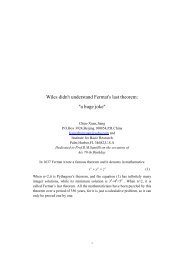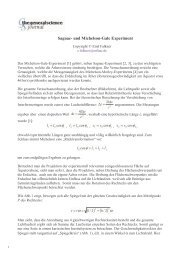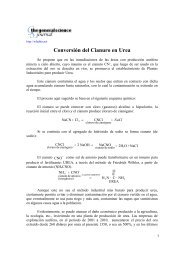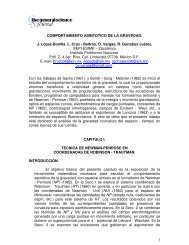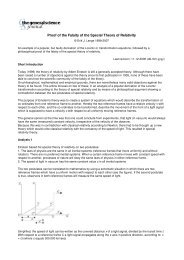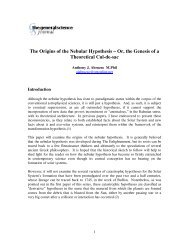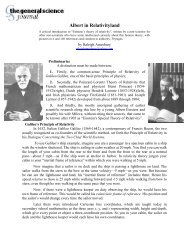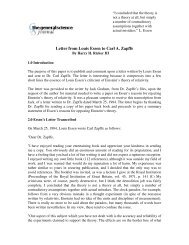MAGNETISM DURING THE SEVENTEENTH CENTURY HH Ricker III
MAGNETISM DURING THE SEVENTEENTH CENTURY HH Ricker III
MAGNETISM DURING THE SEVENTEENTH CENTURY HH Ricker III
Create successful ePaper yourself
Turn your PDF publications into a flip-book with our unique Google optimized e-Paper software.
together in history. The list of first-rate minds includes the names Kepler, Galileo, Descartes,<br />
Pascal, Newton, Leibnitz, Fermat, and Huygens. Significantly, the list excludes William Gilbert.<br />
None of these great minds made significant contributions to the sciences of electricity or<br />
magnetism. We know that Kepler, Galileo, Descartes, Newton and Huygens studied magnetism<br />
but did not make great discoveries or contributions. Only Descartes developed a magnetic<br />
theory; unfortunately a flawed one that was influential for a hundred years. The hidden secrets of<br />
electricity and magnetism remained securely locked away after the intellectual assaults of these<br />
brilliant minds. The wave of progress which occurred during the scientific revolution of the<br />
seventeenth century washed over magnetic science and left it behind, almost the same as it was<br />
at the beginning the century.<br />
One measure of scientific progress is the discoveries or new facts that have been added to<br />
science. Based upon this criteria, progress in magnetic science was not significant. The<br />
mechanical demonstrations developed by Henry Power and Robert Hooke showed that<br />
magnetism could be induced mechanically. But, these new facts are not deemed important today.<br />
The missed opportunities are more significant.<br />
Galileo missed the opportunity to make the important discovery that a magnet can both attract<br />
and repel iron or steel. This is an important magnetic effect. Gilbert failed to detect it as well. He<br />
insisted that Albertus Magnus was wrong in his discovery that a magnet could both attract and<br />
repel iron. The effect results from the fact that a strong magnetic field is needed to reverse an<br />
induced magnetic field. Galileo shows how the result can be used in an entertaining why. But he<br />
failed to publish his results.<br />
The discovery of compass reversal by lightning should have been followed up with the discovery<br />
that lightning was magnetic. However, this seems to have been beyond the thinking of the<br />
mechanical fashion. The incident shows how the experimental method often fails. The result was<br />
interpreted as proof of the mechanical nature of magnetism, not the magnetic nature of lightning.<br />
Another missed opportunity was the failure to follow up on the failed attempts to measure the<br />
variation in 1666. There were efforts urged to perform systematic measurements over a long<br />
period of time. but these were not implemented. The pursuit of science at this time was not<br />
sufficiently organized and methodological to encourage such an enterprise. The Royal Society<br />
seemed to be organized to achieve short term goals, and long term scientific programs of<br />
discovery were not seen as valuable efforts.<br />
A major area of decline was experienced in the practice of magnetic measurement. There is no<br />
evidence of magnetic work using Gilbert’s techniques with the compass needle. The use of iron<br />
filings however, was widely adopted. But, there was no systematic mapping of the field using the<br />
compass or short wires. This is the basis for asserting the decline of magnetic science during the<br />
period. The only measurements that were performed were done using balance scales, as used by<br />
Hooke to perform measures of magnetic force.<br />
Next Chapter Exit



